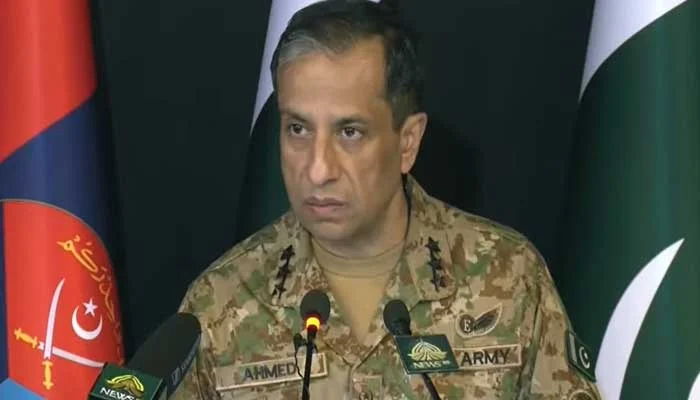The Director General of the Inter-Services Public Relations (DG ISPR), Lieutenant General Ahmed Sharif Chaudhry, has strongly criticized Indian threats to block Pakistan’s water. He called such claims “insane thinking.” In an interview with Al Jazeera, he said, “Only a mad person can believe that India can stop water for 240 million Pakistanis.”
This bold statement came after Indian Prime Minister Narendra Modi announced that Pakistan would no longer receive water from rivers controlled by India. The announcement followed a deadly attack in Indian Illegally Occupied Jammu and Kashmir (IIOJK), which India used as a reason to suspend the Indus Waters Treaty (IWT).
Lt Gen Chaudhry reminded the world that Kashmir is a disputed territory. He stressed that six rivers flow from this region. According to him, if Kashmiris choose to join Pakistan, the rivers will belong to Pakistan. In that case, India will become a lower riparian state. “Then it will be our choice how we deal with the rivers,” he said.
India’s decision to unilaterally suspend the water treaty sparked serious concern. The treaty, signed in 1960 and brokered by the World Bank, ensured water sharing between Pakistan and India. The move came with a number of other aggressive actions against Pakistan following the April 22 attack in IIOJK, which killed 26 Hindu tourists.
Lt Gen Chaudhry highlighted the strength and unity of Pakistan’s people. He said, “Walk through any Pakistani city, and you’ll see determination on the faces of our people.” He emphasized that the ongoing crisis is not just political or military. It is a war of truth and values.
He labeled Pakistan’s position as “Marka-e-Haq,” a struggle based on justice. The military spokesperson accused India of building a false story around the Pahalgam incident. “We asked India for proof. If there is any evidence against Pakistan or our people, show it to the world,” he demanded. He also called for neutral and transparent investigations. “India never had an answer, and still doesn’t,” he added.
The DG ISPR then criticized India’s unprovoked missile strikes on Pakistani soil during the recent Pakistan India War. On May 6 and 7, India launched attacks, claiming to target militant camps linked to the Pahalgam incident. These strikes killed many Pakistani civilians, including women and children.
In response, Pakistan launched “Operation Bunyan-um-Marsoos.” The operation targeted Indian military installations across several regions. The Pakistan Air Force downed six Indian jets, including three Rafales, and destroyed dozens of Indian drones. After 87 hours of conflict, the Pakistan India War ended with a ceasefire on May 10, brokered by the United States.
Lt Gen Chaudhry said India has always relied on drama. “They have a bigger film industry, so creating fake stories is easy for them,” he stated. He stressed that Pakistan hasn’t yet used its full military power. A large part of the Pakistani military is still focused on fighting India-backed terrorism in Balochistan and Khyber Pakhtunkhwa.
Calling India “the biggest sponsor of terrorism in the region,” he said Pakistan has not pulled back any troops from anti-terror operations. He warned that any future Pakistan India War would be dangerous. “Even thinking of war between two nuclear states is madness,” he stated. “India’s obsession with war is like playing with fire.”
He said India is pushing the region toward disaster. In contrast, Pakistan has shown maturity and restraint. “Ceasefire means both sides have stopped. But true peace will only come when India drops its war-driven mindset.”
Lt Gen Chaudhry also raised human rights issues. He accused Indian leaders of oppressing Muslims and other minorities, including Christians, Sikhs, and lower-caste Hindus. “Such injustice creates anger,” he said. “India blames Pakistan for the reactions, but refuses to fix its internal issues.”
He denied India’s claim about an attack on the Golden Temple. “That’s the biggest lie,” he said. He reaffirmed Pakistan’s respect for Sikh holy places like Nankana Sahib, Panja Sahib, and Kartarpur Sahib. “We love our Sikh brothers. There are deep bonds between us,” he added.
Finally, he warned India against repeating its actions. “If India tries this again, our response will be faster and stronger,” he said. He urged Indians to stop relying on lies and focus on truth and self-respect. “Pakistan stood firm in the recent Pakistan India War,” he concluded. “And we will stand firm again, if needed.”


